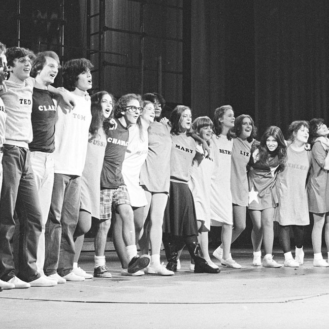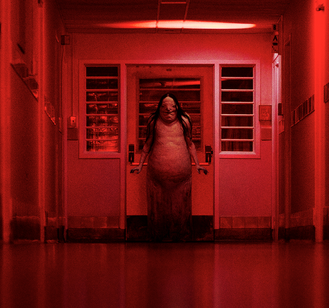By: Liam Parker
Nostalgia in cinema is a fickle thing. If done right, it can invoke memories of a forgotten time; sparking comforting feelings in those that lived through it and sparking interest in those who didn’t. Done wrong however, and it can feel like the film is just rehashing old material – like your drunk uncle telling you the same jokes you read in a dog-eared joke book from your elementary school library. While it is clear that Drinkwater’s director Stephen S. Campanelli has a strong affection for the ’80s and the near mythological directors who came before him like John Hughes and Robert Zemeckis, his love letter to the ’80s comes across as less of an ode to days gone by, and more of a note from their friendly neighbourhood stalker.
Mike Drinkwater (Daniel Doheny of Adventures in Public School and Alex Strangelove) is your typical “John Hughesian” protagonist. A social outcast with a deadbeat dad (played by Eric McCormack of TVs Will & Grace), an obsession with a niche interest (in this case old kung-fu movies), and is hopelessly in love with Danny, the most popular girl in school (Chloe Babcock); so in love, he doesn’t see what he’s been missing this whole time. I would include a spoiler warning for this last bit of plot information, but one can see it coming from, literally, a kilometre away.
In fact, this is what prevents Drinkwater from being anything more than an average film: it is so obsessed with paying homage to the coming-of-age films of the ’80s, it neglected to do anything interesting or subversive with its plot. Are the not-so subtle nods to old school comedies like Ferris Bueller’s Day Off amusing? Sure, but illiciting a “radical reference, bro” from its viewers every 10 minutes is not enough to carry the film through its nearly two hour runtime. There are genuinely heart-wrenching themes of grief, loss, and the disillusion one feels for a family that fails them, but they are lost in a sea of pointless “remember the ’80s?” vignettes. Conflicts feel manufactured, resolutions are forced and unearned, and the movie cannot decide if its rooted in the sly humour of a John Hughes flick, or the so-awkward-it’s-funny mode of films like Juno and Easy A.
There are shining moments in Drinkwater, however. Louriza Tronco’s performance as Wallace, the girl next door, is authentic and compelling. Doheny as our protagonist gives an amusing performance, but sometimes he gets so lost in his own awkwardness that it is no longer funny. The true star of the film is its location and its deep, unwavering love for Canadian culture. The town of Penticton is not only beautiful to look at, but there is an obvious care and meticulousness in building its mythology and presence. Campanelli affectionately establishes a fully fleshed out setting, and illicits feelings that can only be felt in the streets and suburbs of small-town Canada. If more care and attention was given to an original plot, Drinkwater could easily have been the best Canadian comedy of the last five years. But, its cookie cutter plot and “homages” (that are so faithful they feel like rip-offs or parodies) drag down a movie that had the potential of being excellent.
Is Drinkwater an entertaining film? Absolutely, but you have to come to terms with knowing exactly what’s going to happen at every turn. Once you do, the film does provide genuine laughs and heartwarming moments. But in the end, Mike Drinkwater’s AMC gremlin is a perfect analogy for the film itself: a lovingly cared for relic from the ’80s but, underneath its candy-coloured exterior, is a structurally unsound vehicle that gets you from point A to point B and nothing more.





Be the first to comment